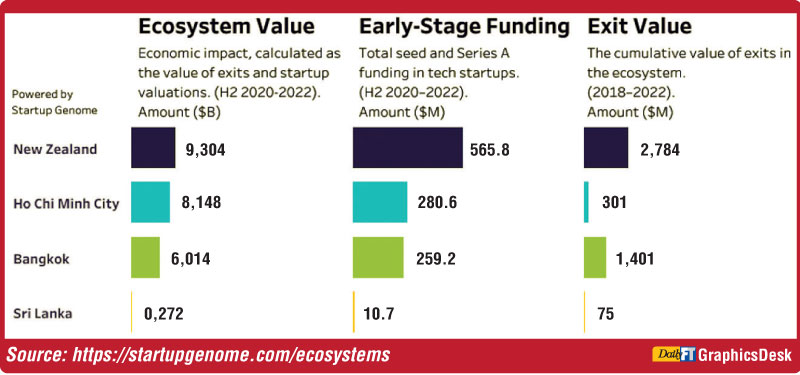Monday Feb 16, 2026
Monday Feb 16, 2026
Monday, 6 November 2023 00:00 - - {{hitsCtrl.values.hits}}

 While the aim of developing a country’s IT sector is to enhance its overall IT capabilities, establishing startups within that IT sector, is what fosters innovation. Startups are about entrepreneurship, and small/medium/large and super large business growth. Therefore, developing the IT sector and establishing IT startups are both vital components of a modern, competitive economy. They complement each other in driving technological advancement and economic prosperity.
While the aim of developing a country’s IT sector is to enhance its overall IT capabilities, establishing startups within that IT sector, is what fosters innovation. Startups are about entrepreneurship, and small/medium/large and super large business growth. Therefore, developing the IT sector and establishing IT startups are both vital components of a modern, competitive economy. They complement each other in driving technological advancement and economic prosperity.
Sri Lanka’s IT journey began a little over 20 years ago and we could say the industry has since grown into a mature market, yielding valuable dollars to the economy. However, it is a recognised fact that much needs to be done as the local industry is still very far from reaching its full potential to grow and produce, especially where our startup ecosystem is concerned.
According to startupgenome, Sri Lanka to date has 748 startups and Startup SL, an initiative by the Ministry of Digital Infrastructure and Information Technology currently being operated by ICTA, aims to create 1,000 more by 2025.
What is a startup? As defined by Startupgenome, “Startup is an innovative or technology-driven company that was founded within the last 10 years and that has technology and/or scalability at the core of its business model.” Therefore, scalability and innovation are core to becoming a startup and when it comes to being innovative, it often requires the support of technology. Therefore, advancements and investments in IT infrastructure are pivotal to the growth of startup ecosystems.
How Sri Lanka fares in comparison with some other startup ecosystems
Sri Lanka has a long way to go in terms of catching up, especially given our lucrative future potential as a small base which is yet to be tapped. We could attract more foreign direct investments as startup funding from angel investors as well as venture capital firms. These investments are pivotal for turning around our economy.
While innovative product or service propositions can propel startups, in terms of ensuring scalability, conducive fiscal and monetary policies are mandatory to avoid them derailing in the longer run. Therefore, it is vital that governments play a key role in driving the growth of a country’s startup ecosystem.
President Ranil Wickremesinghe, who addressed the National ICT Awards NBQSA 2023 held in Colombo recently, highlighted the crucial role digital transformation has to play in ensuring Sri Lanka’s economic prosperity. He stressed that the future lay in the hands of each citizen, acknowledging that missed opportunities and economic setbacks had resulted from not fully embracing the global IT wave. He emphasised that the present moment was Sri Lanka’s last chance to move beyond past failures and join the digital revolution, in order to create a highly competitive and modern economy.
This writer, while agreeing with the president’s sentiments, strongly believes that the path we need to follow in achieving his outlined goals lie in IT startups, an area that hasn’t received sufficient attention so far. This being the case, it needs to be said that our strategies must differ from the broader context of developing the IT industry when addressing this domain.
Developing the IT sector Vs. Developing startup culture
Although developing the IT sector and developing startups in an economy are related, they are distinct initiatives. I have outlined some of the key differences.
Scope:
Target entities:
Goals:
Activities:
Timeframe:
Risk and innovation:
Scale:
Economic impact:
In a nutshell this writer sees the IT industry as the factory and tech startups as the products that come out of it. For the IT sector to grow, it requires more commercial ventures that could drive technology initiatives as well as create opportunities for IT professionals to experiment. Tech startups on the other hand are the test beds of the IT industry.
The way this writer sees it, while much is being done to improve the factory (IT sector), the products that come from it are still far and between. It would be fair to say our startup sector is still fledgling and in its nascent stages. Sri Lanka’s startup ecosystem faces immense pressure and threat from global players and requires protection and careful nurturing to withstand unfair practices. It is unfortunate that our decision makers and policymakers have not wholly recognised this factor. Such is not the case in India, where the government provides valuable support to startups. The Indian government has clearly recognised that their startups are the path to making billion dollar companies, which are the integral building blocks of the trillion dollar Indian economy that’s taking them towards global leadership.
This article is intended to place particular emphasis on the urgent need to focus on our startup ecosystem. Startups are the future of business in any country, and have the potential to draw in foreign direct investment. Another amazing aspect about tech startups is that they can leverage factors that are non-existent in the country.
If that surprises the reader, take, for example, the different global digital companies currently operating in Sri Lanka they use our manpower, road networks, infrastructure and systems to make millions of dollars, which is syphoned out of the country.
Besides supporting entrepreneurs and drawing in investors for startup ventures, Sri Lanka must scrutinise its policies, rules, and regulations related to digital businesses operating within the country. Based on my experience, these factors can either hinder or foster entrepreneurship. Currently, global operators are permitted to function within our borders without complying with local regulations. This issue was acknowledged in a 2019 Central Bank report, but even after several years, they have done little to rectify the situation.
In a few days time, our next budget will be announced and the president will spell out the phases of reinvigorating the economy. It is therefore vital for his advisers and policy makers to pay special attention to the startup ecosystem, with a view of establishing an environment that accelerates growth. This holds political significance because, unlike large corporations that are well established and have consolidated the bases of their beneficiaries, new upcoming startups create unconventional avenues and opportunities right from the grassroots level - the bottom of the Pyramid! They represent a means to empower the masses, by unearthing the potential of untapped audiences in society, thereby ensuring a level playing field for every citizen of Sri Lanka.

(The writer, Startup entrepreneur, Founder CEO of PickMe and a Past President of the Digital Chapter of FITIS, is a driving force in technopreneurship in Sri Lanka. He was instrumental in the launch of several local e-commerce companies. Under his leadership, PickMe’s technology driven platform has changed the transport and food delivery industry in the country, becoming the leading local enterprise of its kind with a sizable market share. His vision is to expand PickMe’s services across the world and to drive the company toward becoming the country’s first Soonicorn.)